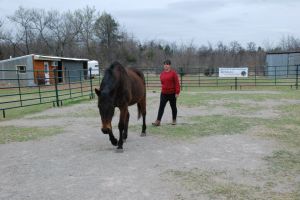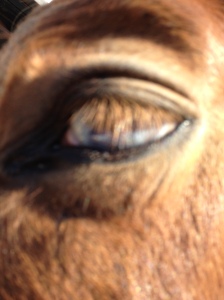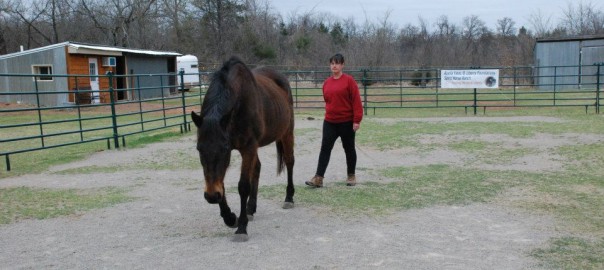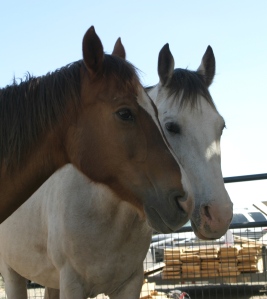So many horses that come into my purview in the past year have been rescue horses, more than ever before. It is a sign of our times that so many horses are desperately in need of homes. Fortunately, the ones I have met recently have been at my clinics and are in my Equine Ortho-Bionomy practice, and have found loving homes.
There are the obvious reasons that many horses become rescues: the economy, the fact that we have an over population of some breeds and horses from certain sports, behavior, and the desire to discard older horses. The roundups of mustangs by the BLM are responsible for a great many rescues, as well as the roundups by the Navajo. Horses come into rescue centers because their owners have died and not made provisions for them, as well as many other more horrendous reasons.
What has happened before the rescue can make or break the health of the individual horse and have a huge impact on how the training of that horse goes. Many horses have been well trained at some point in their lives and had important jobs. But when they fall on hard times, they get into survival mode and a lot of what they learned is no longer primary; their chief goal is to stay alive.
 One such horse at our most recent clinic was Noble who is an amazing Morgan gelding, whom the dentist aged at about 26 years. You can see from Noble’s incredible bone structure and carriage that he was once a highly valued animal, and probably well loved. In the time since his rescue his family has done some liberty training with him under the tutelage of Ruella Yates, my colleague, and yet he will probably never want to leave food, because it may be the last meal he ever gets. That’s the way I think Noble thinks about food. He came into the rescue scoring 1 on the Henneke Body Score Index, which means he was so starved he was near death. ( 1 according to Henneke is Poor: Extremely emaciated; no fatty tissue; vertebrae, ribs, tail head, and bones of withers, shoulder, and neck are visible. Between 4 and 6 is desirable and healthy.)
One such horse at our most recent clinic was Noble who is an amazing Morgan gelding, whom the dentist aged at about 26 years. You can see from Noble’s incredible bone structure and carriage that he was once a highly valued animal, and probably well loved. In the time since his rescue his family has done some liberty training with him under the tutelage of Ruella Yates, my colleague, and yet he will probably never want to leave food, because it may be the last meal he ever gets. That’s the way I think Noble thinks about food. He came into the rescue scoring 1 on the Henneke Body Score Index, which means he was so starved he was near death. ( 1 according to Henneke is Poor: Extremely emaciated; no fatty tissue; vertebrae, ribs, tail head, and bones of withers, shoulder, and neck are visible. Between 4 and 6 is desirable and healthy.)
I have written before about rescue horses (Another Chapter in the Life of Sharif
, but we are seeing more of them and inheriting the emotional, psychological and physical problems of these horses. I wrote before more about the physical aspects of the problem and ensuing nutritional and bodywork requirements.
Many people may want to rescue horses but may be unprepared for what challenges the horse has both physical and mental. The Liberty Foundations are wonderful to teach to these horses (and any horses) because they begin with no expectations. The horse can regain his sense of worth and enjoy food at the same time, but come into relationship with human beings in a healthy and balanced way.
You can tell a horse was once valued by his respect for people, and the training that is on him. But you can also tell that he has been deeply disappointed in life. With Noble, I could see in his eyes some deep resignation. He is grateful for every day he is alive, but he no longer expects much. He doesn’t take much pleasure in activities. I felt this overwhelming desire to fill his heart with joy where there was very little. It wasn’t because of any lack of love from the family who owns him now; it was from a series of events that led him to nearly die before his rescue, to not be able to count on people.
I knew he could reconnect with the horse he was and who he could be from this day forward. He turned out to be willing to leave food in order to explore a new relationship with me. He still believed in the kindness of people, somewhere in his being. He wasn’t simply floating through space. He was engaged.
You might ask, why is it necessary to get him to leave food? The reason is, not to be unkind, but to gain his attention. With a horse like this, he can zone out in the world of food, gaining all his comfort from it. By asking him to leave the food and engage with me, I’m asking to form a relationship with him. I will also bring him back to the food, and offer food in different contexts, such as in the Whoa and Wait Exercise, in which he stands while I walk around him and while I go get him some carrots.
Often, nearly every horse at a Liberty Foundation clinic that I have taught is a rescue horse these days. They come with various issues, although all horses will come with their different concerns and personalities. We hear the stories, “he bucks all the time…” “he can’t do this….” “she won’t let me catch her…” “she’s afraid of people…”
The list goes on and on. The same stories could be attributed to high level performance horses who aren’t living up to their owners’ expectations. They might be expected to do too much, and just break down from the stress. Although they have been well-fed and cared for in a sense, they have endured a great deal of stress.
Stress can come in different forms. Certain types of abuse shows up in certain ways. The abuse levied by human beings is what misshapes horses, and of course, other human beings and other animals as well. Constant stress shapes horses away from normal behavior and the ability to take in new information in a clear and concise way.
That’s where the Foundations can be really helpful, by gently reinstating natural behaviors and allowing the horse to reconnect with people, and possibly their herds, once again.
I realize we can’t rescue them all, but we can put the light back in their eyes with some very focused, gentle work that allows them freedom to be themselves, to have a choice, to develop opinions. Right there, besides giving them the safety of home and food, we can give them a great deal of grace with which to live out the rest of their lives.
I hope you enjoy my video of Noble as he explores a new relationship with me.
[youtube http://www.youtube.com/watch?v=jagabsV39pQ&w=420&h=315]****
(copyright: Susan Smith, OrthoHorse)
Services: Bodywork (Ortho-Bionomy for people, Equine Ortho-Bionomy): private sessions, tutorials, phone consultations, distance healing communication and gift certificates
Liberty Coaching: clinics, mini-clinics, workshops, private and semi-private sessions, tutorials, consultations: by appointment: 505.501.2478 or emailing susansmith@orthohorse.info Spring Lessons – semi-private, private and small group sessions. Scheduling now. Contact me for details.
If you want to host a clinic in your area, contact me to make arrangements. Prices will vary according to location and travel. susansmith@orthohorse.info 505-501-2478
I conducted a free Liberty Coaching Call on March 12. If you did not have a chance to listen, here is the link: http://www.susith.com/orthohorse/freehorseatlibcall.mp3
On the schedule for 2014:
June 14th – Trail Riding Clinic
Where: Headquarters Well, Caja Del Rio, Santa Fe
Time: 9 a.m.-noon
Limited to 4 riders.
Cost: $75
Do you have questions or difficulties riding on the trail with your horse? What would you like to know to make your ride more enjoyable?
Trail riding is not just about “controlling” your horse, it is about establishing a “centaur relationship” that can carry you through all kinds of challenges.
Come learn from a seasoned endurance rider the following tips:
- • Trail etiquette
- • How to be safe
- How to get your horse ready for a trail ride
• What to bring with you
• Training
When we ask a horse to listen to us when we’re on a trail with other horses, we’re asking her to engage with us instead of with the other horses and the distractions that can occur on the trail. In this way, trail riding exposes what is not working in the arena and it exposes where your relationship with your horse needs strengthening. Find out some similarities between liberty training and trail riding.
In this clinic we will talk first about preparation and then work on some ways to manage situations on the trail, while in the saddle. We will take a short trail ride.
Bring:
• Snacks
• Water for you and your horse
• Hay if you want it
• Helmet
• Tack (saddle & some sort of horse headgear required)
Sign up today as enrollment is limited. Flyer for Trail Clinic forthcoming. Contact me for enrollment & liability forms and Payment information. PayPal & checks accepted.
Combining cumulative knowledge from over 18 years of endurance riding, Liberty Horsemanship and Ortho-Bionomy bodywork practice, Susan Smith brings a unique perspective to getting a horse and rider ready for the trail – in mind, body and spirit.
Liberty Foundation work is destined to deepen your trail experience.
Contact Susan Smith@ susansmith@orthohorse.info or 505-501-2478.
*****





A lovely and illuminating story of how to bring joy back into the lives of rescue horses. Thank you, Susan, for speaking for the Horse.